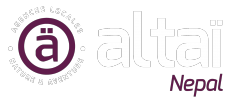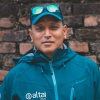Kathmandu, Annapurnas & Dhaulagiri
This trip, easy and accessible, offers enchanting views on the most
beautiful mountains of Nepal. Walk across authentic villages, away from the
most frequented paths, and enjoy the beauty of the Himalayan landscapes without
climbing up too high! From Kathmandu, we take the road to reach the trailhead
in the Annapurna mountains. We begin our trek near the superb village of
Ghandruk, facing Mt. Annapurna South (7219 m) and the superb silhouette of Mt. Macchapuchhre
(6993 m). For 9 days, we walk through rice fields, rhododendron forests and alpine
pastures in the Annapurnas. We come across many traditional hamlets, inhabited
by Gurung people, and it’s an opportunity to discover an authentic Nepal...
Here, there is no need to higher than 4000 meters to enjoy the beauty of the
Himalayas: The fabulous vintage points of Muldai, Kopra and Mohare Danda offer
us some of the most beautiful panoramas of Nepal: the high peaks of the
Annapurnas, the superb east face of the "white mountain", the
Dhaulagiri I (8167 m). We end our adventure in Pokhara, on the shores of Lake
Phewa, with the peaks of the Annapurnas in the background...
Itinerary
-
Day 1 Kathmandu
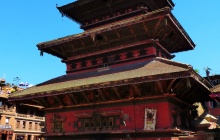 Arrival in Kathmandu (1360m): Welcome to the capital of Nepal. If your arrival time permits, you can enjoy a walking tour of the bustling city of gods. Your local guide can introduce his hometown with its old streets, temples and shops offering a first glimpse into Nepalese life.
Arrival in Kathmandu (1360m): Welcome to the capital of Nepal. If your arrival time permits, you can enjoy a walking tour of the bustling city of gods. Your local guide can introduce his hometown with its old streets, temples and shops offering a first glimpse into Nepalese life.
Accommodation: Hotel
Meals not included -
Day 2 Drive: Kathmandu- Ghandruk (1960M)
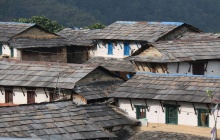 Today, we take the road to the Annapurna region, up to the village of Kimche, the starting point of the trek. Arrival in Kimche in the middle of the afternoon, where we meet our porters and assistant guides. A steady climb in front of Mt. Machapuchare (6993 m) leads us to Gandruk, a beautiful traditional village of the Gurung people.
Today, we take the road to the Annapurna region, up to the village of Kimche, the starting point of the trek. Arrival in Kimche in the middle of the afternoon, where we meet our porters and assistant guides. A steady climb in front of Mt. Machapuchare (6993 m) leads us to Gandruk, a beautiful traditional village of the Gurung people.
Accommodation: Lodge
Ascent: 425m
Trek: 2h
Drive: 7 hrs -
Day 3 Ghandruk - Tadapani (2640M)
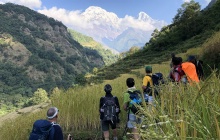 It’s a pleasant discovery of the village of Gandruk, its temples and traditional houses. We then start our trek across rice fields and rhododendron forests to reach the village of Chuile (2050m), via Komrong Danda Pass (2655m) with its views of the Himalayas. Short, steep walk to the village of Tadapani. Arrived at the village, we enjoy the view of the Modi Khola valley leading straight to the Annapurna sanctuary.
It’s a pleasant discovery of the village of Gandruk, its temples and traditional houses. We then start our trek across rice fields and rhododendron forests to reach the village of Chuile (2050m), via Komrong Danda Pass (2655m) with its views of the Himalayas. Short, steep walk to the village of Tadapani. Arrived at the village, we enjoy the view of the Modi Khola valley leading straight to the Annapurna sanctuary.
Accommodation: Lodge
Ascent: +745m
Descent: -80m
Trek: 4h -
Day 4 Tadapani - Isharu (3140 m) - Dobato (3420 m)
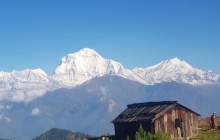 From this day, we leave the classic trail of the the Annpurnas. We embark on the north-west path towards the Muldaï Trek. The path offers the view of the Kimrong Khola valley. A short descent, then we walk up to pastures with closer views of the Annapurna mountains. The slope then becomes steeper along a ridge before arriving at a place called Meshnar (2970 m). Continue along this ridge leading to Isharu, perched on the slope, before arriving at Dobato where we spend the night. From Dobato, we get the first views of Mt. Dhaulagiri I (8167m) and Tukuche Peak.
From this day, we leave the classic trail of the the Annpurnas. We embark on the north-west path towards the Muldaï Trek. The path offers the view of the Kimrong Khola valley. A short descent, then we walk up to pastures with closer views of the Annapurna mountains. The slope then becomes steeper along a ridge before arriving at a place called Meshnar (2970 m). Continue along this ridge leading to Isharu, perched on the slope, before arriving at Dobato where we spend the night. From Dobato, we get the first views of Mt. Dhaulagiri I (8167m) and Tukuche Peak.
Accommodation: Lodge
Ascent: +825m
Descent: -60m
Trek: 4h -
Day 5 Dobato- Muldai Peak (3640 M) - Chistibung (3025 M)
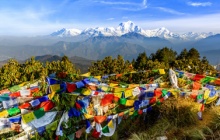 Early morning walk to admire the sunrise from the top of Muldai Peak, where we reach after a mountain pass (3545 m). The view is simply exceptional: 360° with the Annapurnas (I, south, III), the Dhaulagiris chain, the Hiunchuli, and the Machapuchare. We take our time to enjoy one of the most beautiful panoramas in Nepal! Descent to Dobato and stop at the lodge where we spent the night for breakfast. The rest of the day consists of small ascents/descents on ridges offering beautiful views on the surrounding valleys. We arrive at Bayeli, an ideal break for a tea, before starting a great descent to the river.
Early morning walk to admire the sunrise from the top of Muldai Peak, where we reach after a mountain pass (3545 m). The view is simply exceptional: 360° with the Annapurnas (I, south, III), the Dhaulagiris chain, the Hiunchuli, and the Machapuchare. We take our time to enjoy one of the most beautiful panoramas in Nepal! Descent to Dobato and stop at the lodge where we spent the night for breakfast. The rest of the day consists of small ascents/descents on ridges offering beautiful views on the surrounding valleys. We arrive at Bayeli, an ideal break for a tea, before starting a great descent to the river.
Accommodation: Lodge
Ascent: +550m
Descent: -1020m
Walk: 4h -
Day 6 Chistibung - Kopra Danda (3650 M)
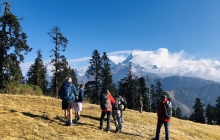 This morning, we climb up the path that leads to Kopra Danda. The views of the Dhaulagiri massif are splendid. Those who wish can rest this afternoon, and others can go on a short excursion with the guide, to explore the surroundings.
This morning, we climb up the path that leads to Kopra Danda. The views of the Dhaulagiri massif are splendid. Those who wish can rest this afternoon, and others can go on a short excursion with the guide, to explore the surroundings.
Accommodation: LodgeAccommodation: Lodge
Ascent: +650m
Descent: -50m
Trek: 4h -
Day 7 Excursion on the crest of Kopra Danda (4200 M) - Chistibung
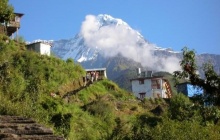 We leave for a day of hiking round trip (optional) on the ridges overlooking Kopra Danda. Along the way, several belvederes offer incredible panoramas! The path climbs to Lake Khayer, a sacred lake perched at an altitude of 4650 m where we will not have enough time to reach. We then descend back to Chistibung via Kopra (the Kopra lodge cannot be booked for two nights in a row during the high season). N.B. The excursion of the day will be adapted according to your desire.
We leave for a day of hiking round trip (optional) on the ridges overlooking Kopra Danda. Along the way, several belvederes offer incredible panoramas! The path climbs to Lake Khayer, a sacred lake perched at an altitude of 4650 m where we will not have enough time to reach. We then descend back to Chistibung via Kopra (the Kopra lodge cannot be booked for two nights in a row during the high season). N.B. The excursion of the day will be adapted according to your desire.
Accommodation: Lodge
Trek: 4h
Ascent: +3
Descent: -700m -
Day 8 Chistibung - Swanta (2220 M)
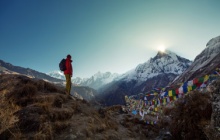 Long day of descent through the rhododendron forest. The trail winds down to the river which we cross by a wooden bridge. We then reach a bamboo forest, then barley and potato fields which lead to the village of Swanta, where we spend the night.
Long day of descent through the rhododendron forest. The trail winds down to the river which we cross by a wooden bridge. We then reach a bamboo forest, then barley and potato fields which lead to the village of Swanta, where we spend the night.
Accommodation: Lodge
Trek: 4h
Ascent: +160m
Descent: 1600m -
Day 9 Swanta - Ghorepani (2850m)
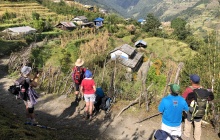 Descent amid rice fields down to the river which we cross on a suspension bridge. We pass by the village of Chittre, then we walk up towards Ghorepani, where we spend the night
Descent amid rice fields down to the river which we cross on a suspension bridge. We pass by the village of Chittre, then we walk up towards Ghorepani, where we spend the night
Accommodation: Lodge
Ascent: +770m
Descent: -90m
Trek: 3h -
Day 10 Ghorepani - Poon Hill - Mohare Danda (3330 M)
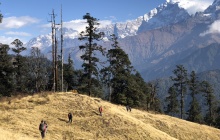 Superb day ahead with two very beautiful viewpoints. We start at daybreak with a climb to see the Poon Hill (3150 m) viewpoint, more classic and frequented than the Mohare View Point, that we will see later in the day. Superb views of the Annapurnas and Dhaulagiris range. We then walk on a beautiful ridge to reach Mohare Danda with a constant view of the Dhaulagiris. This wild path crosses mountain pastures where yaks and buffaloes often graze. Arrival at Mohare Danda in the middle of the afternoon. The view is sublime: Mardi Himal, Lamjung Himal, Annapurnas, Dhaulagiri, Macchapucchare follow one another!
Superb day ahead with two very beautiful viewpoints. We start at daybreak with a climb to see the Poon Hill (3150 m) viewpoint, more classic and frequented than the Mohare View Point, that we will see later in the day. Superb views of the Annapurnas and Dhaulagiris range. We then walk on a beautiful ridge to reach Mohare Danda with a constant view of the Dhaulagiris. This wild path crosses mountain pastures where yaks and buffaloes often graze. Arrival at Mohare Danda in the middle of the afternoon. The view is sublime: Mardi Himal, Lamjung Himal, Annapurnas, Dhaulagiri, Macchapucchare follow one another!
Accommodation: Lodge
Ascent: +710m
Descent: -280
Trek: 4h -
Day 11 Pokhara - Kathmandu
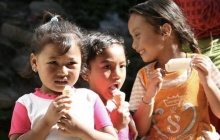 After breakfast, drive to Kathmandu. Transfer to the hotel and free day. Comfort option: possibility of taking a flight between Pokhara and Kathmandu or possibility of extending your stay in Pokhara or Kathmandu: see "options" section.
After breakfast, drive to Kathmandu. Transfer to the hotel and free day. Comfort option: possibility of taking a flight between Pokhara and Kathmandu or possibility of extending your stay in Pokhara or Kathmandu: see "options" section.
Accommodation: Hotel
Drive: 6h or Flight (25 minutes) -
Day 12 End of Stay
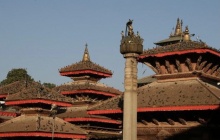 End of our services. International return flight.
End of our services. International return flight.
Dates & prices
International departures:
No departure for now
Trip code: NEPKOP-EN
Included
- All transfers by private vehicle as detailed in itinerary
- 3 * hotel and B&B accommodation in Kathmandu (Hotel Tibet, Manaslu or similar)
- 2 * hotel accommodation in Pokhara (Hotel Lake View or similar)
- Full board for the trek
- Accompaniment by an English speaking Altaï Guide
- Visits as per itinerary: with a cultural guide and a private vehicle
- Luggage: up to 12kg maximum per person during the trek
- Trekking support team: assistants and porters
- Trekking permits: ACAP and TIMS
- Staff Insurance
Not included
- Entrance to historical sites, monuments and museums
- Meals in Kathmandu & Kathmandu Valley
- Nepalese visa: US $ 25
- International flights
- Insurance: Repatriation, Medical & Helicopter Services
- Drinks, tips and personal expenses
Terms and conditions
Booking conditions
Invoice procedure
Cancellation policy
- Cancellation received more than 30 days prior to the departure date: a sum of €50 per person will be retained
- Cancellation received 30 to 21 days before the departure date: your deposit, 30% of the total trip price will be retained
- Cancellation received 20 to 14 days before the departure date: 50% of the total trip price will be retained
- Cancellation received 13 to 7 days before the departure date: 75% of the total trip price will be retained
- Cancellation received less than 7 days before the departure date: 100% of the total trip price will be retained
- Fixed airfares: if your airline ticket was issued in advance, often done to avoid significant surcharges, you will be charged 100% of any non-refundable fees if you wish to change or cancel your flight plan.
- Fixed in-country costs: early charges for firm bookings will be charged if you cancel or modify your trip.
- Insurance costs: if you have taken out comprehensive or cancellation insurance, the cost of insurance is due and cannot be refunded.
Changes to travel contract
Pricing
Contract transfer
Insurance
Practical info
Staff
Food
Accommodation
Transportation
Budget & exchange
Tips
Vital equipment
- Warm Sleeping Bag
- Water purifiers (micropur, aguatabs ...)
- A cap or sunhat
- 1 or 2 sets of thermals: long-sleeved thermal tops and full-length long johns
- Long sleeved and short sleeved t-shirts, preferably in quick-drying technical material
- A light fleece or equivilent (plus extra warm layers if necessary)
- A breathable wind proof, waterproof jacket (Gore-Tex...)
- Lightweight waterproof over trousers
- Suitable shorts
- Walking trousers
- A pair of high-rise walking boots - strength, good grip of the foot and ankle (high stems) and impermeability are essential. Choose shoes with non-slip soles (vibram).
- A pair of trainers/sandels or equivilent casual shoes for cities, villages and evenings
- Thick walking socks
- Warm gloves, hat and scarf (it can be chilly in the mountains)
Material
- Your personal toiletries and a fast drying towel
- Water bottle(s). Min. 2 litres, light and isothermal
- A good pair of sunglasses (think min. category 3)
- Sun-cream, face and lips
- Head torch and spare batteries
- A pocket knife
- A pair of hiking poles
- A waterproof bag cover (or plastic bags) to protect your belongings
- Toilet paper
- Anti-bacterial hand gel
- Your camera
- A notebook or travel journal
Helpful equipment
Luggage
- A rucksack (35-40L or 45-50L) for use as a day bag. This will contain your (vital) personal belongings for the day (sweater, spare t-shirt, water bottle, picnic-lunch, sunglasses, small things ... )
- We use porters to transport our other belongings when trekking. Please bring a flexible travel bag with zips for easy access max 80L and max 13kg (16kg with camping gear). Please do not bring suitcases or other hard bags which the porters cannot transport.
- You may also be able to store some belongings securely at the hotel in Kathmandu.

